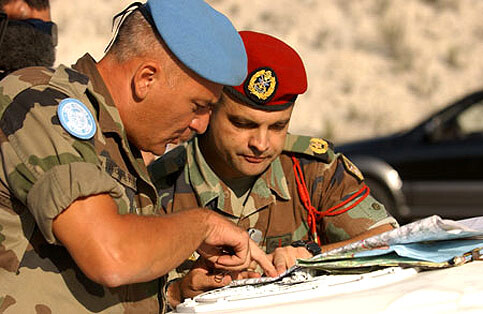United Nations News Service 1 March 2007

A UNIFIL peacekeeper liaising with an officer from the Lebanese Army. The Lebanese army has been deployed south of the Litani river for the first time in thirty years, south Lebanon, 19 September 2006. (UNIFIL Photo)
A senior United Nations official today discussed with Lebanese officials full implementation of the Security Council resolution that ended last summer’s war between Israel and Hizbollah, following similar talks earlier this week with Israeli authorities.
“We discussed many issues from the question of prisoners, Israeli prisoners in Lebanon, Lebanese prisoners in Israel — we would like to see more progress on that,” Secretary-General Ban Ki-moon’s Special Advisor on the situation in the Middle East Michael Williams told reporters after meeting with officials in Beirut, the Lebanese capital, in preparation for Mr. Ban’s next report to the Council on the situation.
“We also discussed the issue of Israeli overflights which are a violation of Lebanese sovereignty and occur on a regular and indeed a daily basis. We discussed the issue of munitions in the south, both landmines and the far more difficult issue of cluster bombs.”
Mr. Williams noted that there had been some progress on landmines with Israel providing military maps that have helped with their destruction, but the issue of the far more deadly cluster bombs used by Israel last summer has been far more difficult. UN officials have frequently cited the dangers to civilians in their villages and fields from unexploded cluster bombs.
Last month, a UN Environment Programme (UNEP) report stressed the importance of rapidly removing them, especially in southern Lebanon where large areas of economically important agricultural land have become “out of bounds” for farmers, noting that de-mining could take up to 15 months.
Council resolution 1701 adopted in August mandated the complete withdrawal of Israeli troops from southern Lebanon together with Lebanese army deployment in the area.
It also enhanced the UN Interim Force in Lebanon (UNIFIL), first created in 1978 to confirm an Israeli withdrawal after an earlier incursion, to monitor the cessation of hostilities.
UNIFIL now fields more than 12,000 troops out of its new ceiling of 15,000. Israel has withdrawn from all Lebanese territory except for the northern part of the village of Ghajar which straddles the line separating the two sides.
Related Links